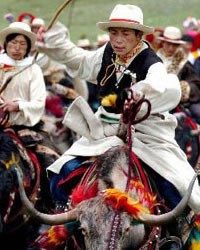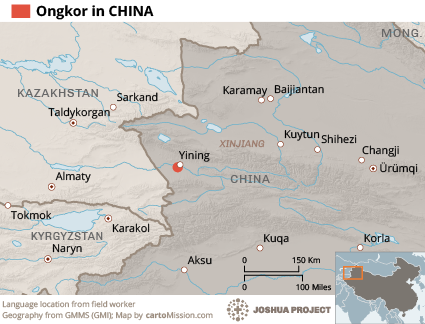The few remaining Ongkor have been included as part of the Ewenki nationality in China. The Ongkor do not use the name Ewenki but sometimes refer to themselves as the Xinjiang Solon.
The Ongkor are the remnant from a tumultuous time in history. Their ancestors were a diaspora group of Solon Ewenki who were sent to Xinjiang from Manchuria in 1763. Other troops who made the yearlong march across China included the ancestors of today's Western Xibe and Western Daur minorities. The reigning Manchu Dynasty ordered them to bring the hostile western front of China under control. After the collapse of Manchu rule, the soldiers and their families decided to stay in Xinjiang.
The Ongkor have few distinct customs left. They have adopted the lifestyles of their Western Daur and Han Chinese neighbors. The Ongkor emphasize courtesy in accordance with seniority. "When someone meets an older person, he offers tobacco to him, bends his knees, stands aside and bows to show his greeting. Even when he is on a horse, he should dismount to greet first."
Although the other Ewenki groups in China have shamans and worship a wide range of gods and idols, the Ongkor have lost these practices. They could best be described as animists, believing all natural forces have a soul. Most Ongkor under the age of 40 are atheists who have no religious beliefs.
Throughout their history, from the time they were a numerous people to their current state on the verge of extinction, the Ongkor people have never been touched by Christianity. There has never been a known Ongkor church. The western Xinjiang region - a stronghold of Islam - is one of the least evangelized places in the world.
Scripture Prayers for the Ongkor in China.
| Profile Source: Operation China, Asia Harvest Copyrighted © Used with permission |











